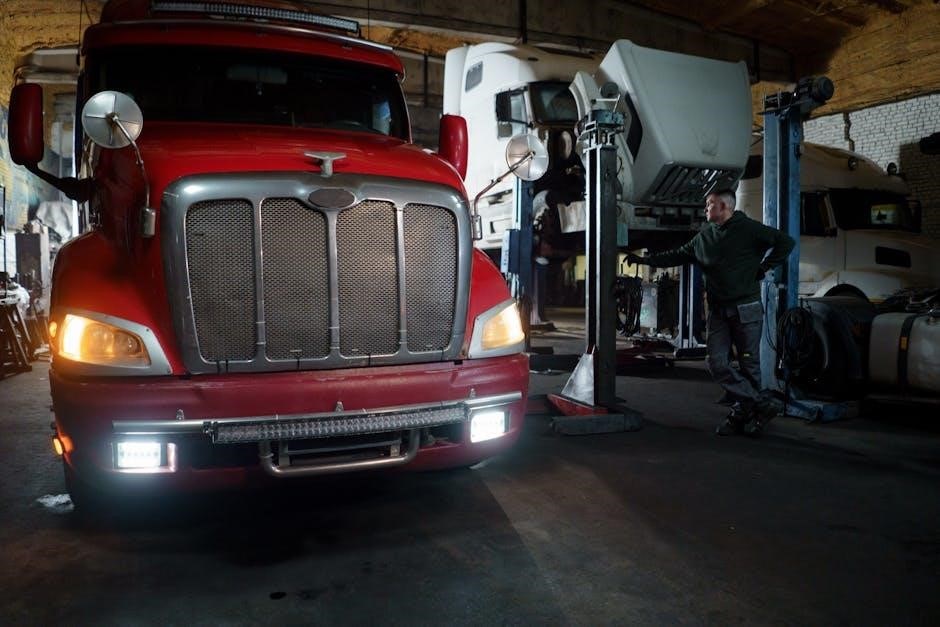
-
By:
- ida
- No comment
colorado commercial driver’s manual
The Colorado Commercial Drivers Manual is your guide to safe and lawful commercial driving. It prepares you for the CDL written test and ensures understanding of safety practices, traffic laws, and necessary information for obtaining your CDL.
Purpose and Scope of the Manual
The Colorado Commercial Drivers Manual is designed to provide a comprehensive guide for drivers seeking a Commercial Driver License (CDL). Its purpose is to outline the rigorous standards for operating commercial vehicles in Colorado, ensuring safe and lawful driving practices. The manual covers essential topics such as traffic laws, vehicle inspections, and medical requirements. It serves as a vital resource for both new and experienced drivers, helping them understand the state’s specific CDL regulations and prepare for the licensing process.

Understanding the Colorado CDL Overview
The Colorado CDL Overview provides a detailed explanation of the requirements, regulations, and responsibilities for obtaining and maintaining a Commercial Driver License in Colorado.
Types of Commercial Driver Licenses (CDLs) in Colorado
Colorado offers three primary classes of CDLs: Class A, Class B, and Class C. Class A allows operation of combination vehicles with a trailer weighing over 10,001 lbs. Class B is for heavy straight trucks, while Class C covers small passenger vehicles or hazardous materials. Additional endorsements, such as H (hazardous materials) and S (school bus), may be required for specific roles. Each class and endorsement requires unique testing and training to ensure safe and legal operation of commercial vehicles in Colorado.
Eligibility Requirements for a Colorado CDL
To apply for a Colorado CDL, you must be at least 21 years old for interstate driving or 18 for intrastate operations. You must provide proof of residency and pass a background check. A valid medical certificate from a DOT-approved examiner is mandatory. Applicants must also pass vision and knowledge tests. Additional requirements may apply depending on the type of CDL and endorsements sought. Meeting these eligibility criteria ensures compliance with state and federal regulations for operating commercial vehicles safely and legally in Colorado.

The CDL Application Process in Colorado
The Colorado CDL application process involves submitting required documents, paying fees, and completing written and skills tests. It ensures an efficient and streamlined path to obtaining your license.
Step-by-Step Guide to Applying for a CDL
Applying for a CDL in Colorado begins with meeting eligibility requirements and gathering necessary documents. Next, complete a CDL application at a Colorado DMV office. Pass the vision test, then take the written knowledge exam. After passing, obtain a CLP and schedule a skills test. Upon passing the skills test, your CDL will be issued. Each step must be completed in order to ensure compliance with state regulations and safety standards.
Required Documents and Fees
To apply for a Colorado CDL, you must provide proof of identity, residency, and legal status. Required documents include a valid passport, Social Security card, and two proofs of Colorado residency. The application fee for a CDL is currently $50, with additional fees for endorsements or testing. Payment can be made via cash, check, or credit card at the DMV office; Ensure all documents are up-to-date to avoid delays in the application process.
Study Materials for the Colorado CDL
The Colorado CDL Handbook is the primary study material, offering detailed information on state-specific rules, safety guidelines, and necessary knowledge for the CDL test. Additional resources include practice tests and online tools to aid preparation.
Overview of the Colorado CDL Handbook
The Colorado CDL Handbook is a comprehensive guide designed to help individuals prepare for the Commercial Driver License (CDL) test. It covers state-specific rules, safety practices, and detailed information on operating commercial vehicles. The handbook includes sections on vehicle inspection, traffic laws, and eligibility requirements. It serves as a primary study resource, ensuring applicants understand the responsibilities and regulations associated with commercial driving in Colorado. The manual is available for free and is essential for mastering the knowledge needed to obtain a CDL.
Importance of Practice Tests and Study Resources
Practice tests and study resources are essential for mastering the Colorado Commercial Drivers Manual. They help familiarize applicants with the exam format and content, reducing test anxiety. By identifying weak areas, practice tests enable focused study, ensuring better retention of critical information. Utilizing online tools, guides, and other resources enhances learning and improves overall performance, making it easier to succeed on the CDL exam and become a knowledgeable commercial driver.

Safe Driving Practices for Commercial Vehicles
Safe driving practices for commercial vehicles involve defensive driving, regular vehicle inspections, and adherence to traffic laws. These practices minimize risks and ensure public safety on Colorado roads.
Defensive Driving Techniques
Defensive driving techniques are essential for commercial vehicle operators to anticipate and respond to potential hazards. These include maintaining a safe following distance, staying alert to surrounding traffic, and adjusting speed according to road conditions. Additionally, being aware of blind spots, using mirrors effectively, and avoiding distractions are critical. Defensive driving also involves predicting the actions of other drivers and being prepared to react. By adopting these practices, commercial drivers can significantly reduce the risk of accidents and ensure safer roadways for everyone.
Vehicle Inspection and Maintenance
Regular vehicle inspection and maintenance are vital for ensuring the safety and efficiency of commercial vehicles. Drivers must perform pre-trip and post-trip inspections to check critical components like brakes, tires, lights, and suspension. Proper maintenance involves addressing issues promptly, adhering to manufacturer guidelines, and keeping records of inspections and repairs. Well-maintained vehicles reduce the risk of mechanical failures and contribute to safer road operations, as outlined in the Colorado CDL manual. Consistent upkeep also helps prevent costly breakdowns and potential accidents.

Medical Requirements for Commercial Drivers
Commercial drivers must meet strict medical standards to ensure public safety. The DOT physical examination verifies fitness for operating heavy vehicles, covering vision, blood pressure, and overall health.
DOT Physical Examination Requirements
All commercial drivers must pass a DOT physical examination conducted by a certified medical examiner. The exam evaluates vision, blood pressure, hearing, and overall health to ensure fitness for driving. Drivers must meet specific medical standards, and certain conditions, such as impaired vision or high blood pressure, may disqualify them. The medical certificate is valid for up to two years, depending on health status, and must be renewed periodically to maintain CDL eligibility.
Submitting a Medical Certificate
After completing the DOT physical, drivers must submit the medical certificate to the Colorado DMV. This can be done online, by mail, or in person. The certificate must be valid and include the examiner’s signature and certification date. Drivers are required to keep their medical certification up to date, as expiration may result in CDL suspension. The certificate is typically valid for up to two years, depending on individual health conditions. Prompt submission ensures uninterrupted commercial driving privileges in Colorado.
Colorado Traffic Laws and Regulations
Colorado enforces specific traffic laws for commercial vehicles, ensuring safety and compliance. Drivers must adhere to weight and size restrictions, speeding limits, and safety standards.
Specific Rules for Commercial Vehicles
Colorado enforces strict rules for commercial vehicles to enhance road safety. These include weight and size restrictions, mandatory stops at weigh stations, and adherence to specific speed limits. Drivers must also comply with hours of service regulations, ensuring they do not drive beyond permissible hours without rest. Additionally, commercial vehicles are subject to regular inspections to maintain roadworthiness. These rules are designed to reduce accidents and ensure the safe operation of large trucks and buses on public roads.
Understanding Weight and Size Restrictions
Colorado has specific weight and size limits for commercial vehicles to ensure safe travel and prevent infrastructure damage. The maximum gross vehicle weight is typically 80,000 pounds, with axle load limits strictly enforced. Vehicle dimensions, including length and height, must also comply with state regulations. Overweight or oversized vehicles require special permits, often accompanied by escort vehicles for safe passage. These restrictions help maintain road integrity and minimize hazards on public highways.
Disqualifications and Violations
Colorado’s CDL disqualifications arise from major and minor violations, such as DUI or reckless driving, leading to license suspension or revocation, impacting a driver’s eligibility.
Common Offenses Leading to CDL Disqualification
Common offenses leading to CDL disqualification include driving under the influence, reckless driving, speeding, and traffic violations involving fatal accidents. These offenses result in mandatory license suspension periods, ranging from 60 days to lifetime disqualification, depending on the severity and recurrence of violations. Additionally, accumulating too many points on a CDL can also lead to disqualification. These penalties are enforced to ensure public safety and maintain the integrity of commercial driving standards in Colorado.
Consequences of Traffic Violations
Traffic violations for CDL holders in Colorado result in severe penalties, including fines, license suspension, and points on the driver’s record. Accumulating excessive points can lead to disqualification. Severe offenses, such as DUI or reckless driving, may result in CDL revocation. These consequences aim to ensure public safety and maintain high standards for commercial drivers. Violations can also impact employment opportunities and require completion of remedial training or legal action to reinstate driving privileges.

Additional Resources for Colorado CDL Holders
The Colorado Department of Revenue website offers resources, including online tools for CDL-related services and updates to the commercial drivers manual, ensuring drivers stay informed and compliant.
Where to Find the Latest CDL Manual Updates
The Colorado Department of Revenue website provides the most up-to-date version of the CDL manual. Visit their official site for free downloads or access the latest updates. The manual is regularly revised to reflect changes in state and federal regulations. You can also find direct links to downloadable PDF versions for 2023 and 2025. These updates ensure compliance with current safety practices, traffic laws, and licensing requirements for commercial drivers in Colorado.
Online Tools for CDL-Related Services
Colorado offers convenient online tools for CDL-related services through the Department of Revenue website. Drivers can request driver records, pay citations, and submit medical certificates electronically. These tools streamline processes, reducing the need for in-person visits. Additionally, the website provides direct access to the latest CDL manual updates and application resources. These services are designed to make managing your CDL efficient and accessible from any location with internet access.